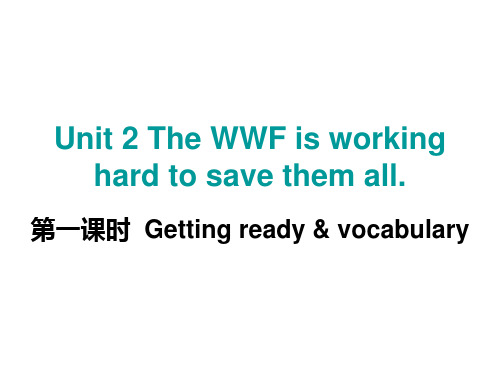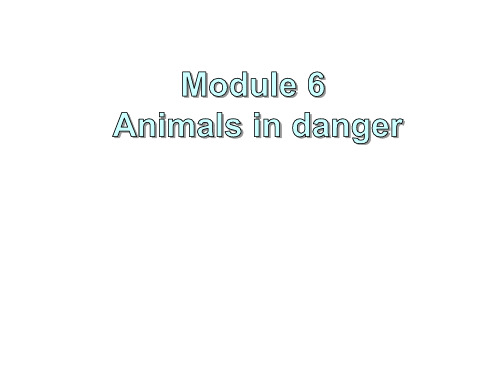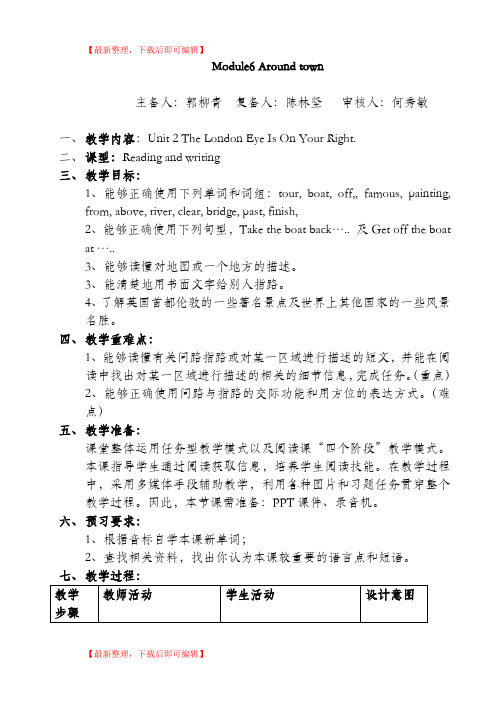module6-unit2第二课时
Module 6 Unit 2 Where do you live(教案)-2021-2022学年英

II.Presentation1. Let’s chant. (part 1):Boy, boy!Where do you live?I live in Shanghai.Moon, moon!Where do you live?I live in the sky.巩固新单词live,moon,live,sky;总结句型:Where do you live?I live in ....2.Listen and circle the words.圈出听到的单词。
3.Listen and answer.(part 2)T:Now,let’s listen this text ,then answer three questions.Q1:Where does Tingting live?Ss:She lives in Beijing.Q2:Is it a big city?Ss:Yes, it is.Q3:What school does she go to?Ss:She goes to Qianmen School.4.Let’s imitate.T:Let’s imitate this text.And pay attention the pronunciation and intonation.同桌练习3分钟后,选择展示方式:A:Read together.(两人共同朗读)B:Read and act.(情景剧表演)C:On your own ways.(自创展示方式)T: Let’s retell the text.6.Practise:Introduce yourself学生自主练习后同桌进行对话练习,一问一答,互相了解对方的居住地,并体会本节课句型的实际用法。
I.Warming up:Pair work:Ask and answer:A: Where do you live?B: I live in....Presentation:英语演讲比赛之自我介绍T:Let’s introduce yourself.Where do you live?What school do you go to?The best will be the English star.Read by yourself:III. Let’s write.学习字母Ll,Mm,Nn的写法,教师讲解要点。
第二课时外研版英语八年级上册Module6Unit2教学设计

(二)讲授新知,500字
在导入新课之后,我将系统地讲授以下新知识:
1.词汇教学:通过PPT展示新词汇,如“concern”, “decrease”, “waste”, “reuse”, “recycle”等,并配以例句和图片,帮助学生理解和记忆。
四、教学内容与过程
(一)导入新课,500字
在本节课开始时,我将通过以下方式导入新课:
1.展示图片:呈现一系列与环保相关的图片,如污染的河流、垃圾分类等,引导学生观察并思考这些图片所传达的信息。
2.视频引入:播放一段关于环保的宣传视频,让学生了解环保的重要性,激发他们的学习兴趣。
3.问题引导:提出问题,如“Do you think it's important to protect the environment?”和“What can we do to save energy and reduce waste?”让学生思考并展开简短讨论。
4.自主学习法:鼓励学生在课后进行自主学习,通过查阅资料、观看视频等途径,拓宽知识面。
(三)情感态度与价值观
在本章节的学习过程中,学生将形成以下情感态度与价值观:
1.意识到环保的重要性,树立环保意识,自觉承担起保护环境的责任。
2.关注社会问题,关心人类生存环境,培养关爱自然、关爱他人的情感。
3.增强团队合作意识,学会倾听他人意见,尊重不同观点。
1.词汇巩固:请学生将本节课学习的新词汇整理成词汇表,并尝试用这些词汇造句,加深对词汇意义的理解。
-提示:可以结合日常生活中的环保行为,如“Reducing paper usage at school is an effective way to save trees.”
秋八年级英语外研版上册课件:Module 6 Unit 2(共20张PPT)

( A )3. It’s difficult for us __________ a
perfect plan.
A. to develop
B. developing
C. develop
D. developed
( B )4. China is a __________ country.
A. develop
__________ meat. Sometimes he feeds something else
__________ it.
A. to; to
44页)
【要点思维导图】
【举例】He feeds meat to the dogs.=He feeds the
dogs with meat. 他给狗喂肉。
The sheep feed on grass. 羊以草为食。
【应用】
( C )1. Sometimes Mr Green feeds his little dog
【应用】
( B )1. His work is mainly in __________.
A. dream
B. research
C. thinkD. t来自ll( C )2. The scientists are doing research
__________ the bird flu (禽流感).
their names are Bob and Eric.
二、用所给单词的适当形式填空
small need choose may save
1. Every day a panda ___n_e_e_d_s___ lots of bamboo to eat. 2. In the end we ___c_h_o_s_e___ Dale to be our PE monitor. 3. People must work hard __t_o__s_a_v_e__ more animals. 4. The bamboo forests are getting __s_m_a_l_l_e_r__ than they were before. 5. —Bill and his sister ___m_a_y_____ return to London next week.
外研版八年级英语上册 Module 6 Unit 2 课件(共56张PPT)

Let's play a guessing game.
It is fat but lovely. It has two black eyes. It can climb the trees. It has a black and white fur. It sometimes eats meat. It lives only in China. It looks like a bear. It usually eats bamboo shoots and leaves.
4. Is the panda the symbol of all animals in danger? Yes, it is.
Complete the sentences. 1. Scientists do a lot of research
t_o_h__el_p__p_a_n_d_a_s_t_o_p_r_o_d_u__ce__m_o_r_e__b_a_b_ie_s_ a_n_d__h_e_l_p_b_a_b_y__p_a_n_d_a_s_l_i_v_e___________. 2. The government is setting up nature parks _to__p_r_o_te_c_t_p_a_n_d__a_s_in__t_h_e_w__il_d_. 3. The WWF chose the panda to__b_e_i_t_s_s_y_m_b__o_l ____. 4. The WWF is working hard _to__s_a_v_e_a_l_l _th__e_a_n_i_m_a_l_s___.
People all over the world love pandas, and the panda has become a (8) s_y_m__b_o_l_ of China.
外研版八年级英语下册课时训练:Module 6 Unit 2(第2课时)

Unit 2 第2课时Ⅰ.根据句意及首字母提示补全单词1.In the end, the surprising r of the match made all of us excited.2.Since he was young, he has shown a great i in stamp collecting.3.Mo Yan's winning Nobel Prize shows that he has had much s in writing.cation plays an important part in one's life and it can help you grow as a p.5.We usually do some a after school, such as playing football, basketball and table tennis.Ⅱ.用所给单词的适当形式填空6.His dream is to go (sail) across the Pacific Ocean.7.[2020·荆门] Doing outdoor (activity) can help students improve their abilities and skills.8.David's (success) career made his parents proud of him.9.The girl wants to be one member of the (write) class.10.Tony has taken part in several competitions and he won't forget the (experience).Ⅲ.同义句转换11.Some hobbies like reading and painting are very relaxing.Some hobbies reading and painting are very relaxing.12.I enjoy taking care of animals.I enjoy animals.13.She can speak French and English.She can speak French English.14.Most children like Superman, so he becomes famous all over the world.Most children like Superman, and , he becomes famous all over the world.15.Kate likes writing. She also likes painting.Kate likes painting writing.Ⅳ.单项填空()16.[2020·广元]Facial recognition(人脸识别) technology is widely used for payment. , we needn't enter the passwords any more.A.For exampleB.As a resultC.What's more()17.I will volunteer for a two-day homestay for an exchange student from the UK. I consider it a good chance to show Chinese food our kindness.A.as well asB.so well asC.as good asD.so good as()18.[2019·哈尔滨] Kids like reading stories which can make them .A. laughB.to laughughing()19.The girl has to her grandma because her parents are working in another city.A. look atB.look intoC.look throughD.look after()20.[2019·重庆B]Miss Chen, my dear English teacher, often encourages me the challenges in my study.A. faceB.facesC.facingD.to faceⅤ.完形填空When I was in primary school, I fell in love with reading. The books 21me to a wonderful world. The more I read, the more I wanted to know. However, my parents 22 afford so many books. I had to solve the problem myself.There was a bookshop near my home. One day I walked into 23shop and picked up a book.I didn't know whether 24there without buying any books. 25I wasn't noticed, I just read a few pages and then put it back. Luckily, no one noticed me. After that, I went there to read every day. Several days later, while I was reading, the owner came up and asked, “You like reading?” I looked down and replied 26, “Yes.” “Don't worry,” he said with a smile. “You may read books here 27you help me clean the shop.” I felt quite surprised.“ Really? It's so kind of you!” I was very happy that he 28me to read there. From then on, I spent a little time cleaning the shop. After that, I quietly read there. That way, I read lots of books. I became one of 29writers in our school. I even won some prizes in writing.Now studying in high school, I can borrow books 30the library. My hobby of reading is kept. It will make a big difference to my life.()21.A.brought B.are bringing C.bring D.have brought()22.A.couldn't B.mustn't C.needn't D.shouldn't()23.A.a B.an C.the D./()24.A.can I read B.I can read C.could I read D.I could read()25.A.Make sure B.To make sure C.Believe in D.To believe in()26.A.nervous B.nervously C.angry D.angrily()27.A.if B.although C.before D.unless()28.A.encouraged B.made C.allowed D.understood()29.A.good B.the best C.poor D.the poorest()30.A.to B.for C.with D.fromⅥ.阅读理解It's a cold, grey Sunday afternoon in March. The British are all working in their gardens. They're digging, cutting leaves and planting new seeds(种子). By summer, their gardens will be full of bright colours.The British love their gardens. A British newspaper recently asked people their opinions about them. Around 70% of the people felt it was important to spend time in the garden, and over 50% of these described gardening as the most enjoyable thing they ever did.Only one in ten houses in Britain do not have a garden. People who live in houses without gardens often rent(租用) land from the government.At first, only very rich people had gardens. You can still see the gardens around houses with a long history, such as Chatsworth House or Castle Howard. In the early twentieth century, however, gardening became a hobby. People bought different kinds of seeds and plants for their gardens. Although roses, sunflowers and tomatoes are often grown in British gardens, they originally(起初) grew wild in other countries.Every year, there are competitions for the largest vegetables, but don't expect to win: Britain's biggest carrot is almost six metres long.()31.In summer, British gardens are often .A.full of people digging thereB.colourful with different plantsC.too hot for people to work thereD.covered with grey leaves and plants()32.A recent survey showed that of the British felt it important to do some gardening.A.around 70%B.over 50%C.only 20%D.about 10%()33.We can infer from Paragraph 4 that .A.seeds were provided for freeB.roses were first grown in BritainC.gardening is a hobby in the worldD.the owner of Chatsworth House was rich()34.What does the underlined sentence mean?A.It is easy to grow big vegetables.B.It is hard to win the competition.C.The carrot is much easier to grow.D.The carrot is the writer's favourite vegetable.Ⅶ.根据短文内容和所给中文提示,在空白处写出单词的正确形式Do you like collecting things? Do you have a hobby? We all know many people have 35.(爱好) and they play an important part in our life. Some people like 36.(种植) flowers, some like singing and others like making model ships. I am 37.(感兴趣) in stamps and started to 38.(收集) them three years ago.My father works in a big 39.(公司). He always goes abroad. Three years ago, when he was working in America, he 40.(寄) home a letter with a beautiful stamp on the envelope. I liked the stamp very much. From 41.(那时) on I always asked my father to send me different 42.(邮票) from different countries. Later I joined a club and made many friends there. They help me learn more about stamps and always exchange stamps with me. And I get some 43.(特别的) stamps from them.Now I have more than a thousand stamps. When I look through these beautiful stamps, I feel 44.(放松的) and happy. I can also enjoy the beautiful designs of stamps.详解详析Ⅰ.1.result 2.interest 3.success4.person5.activitiesⅡ.6.sailing7.activities8.successful9.writing10.experiencesⅢ.11.such as12.looking after13.not only; but also14.as a result15.as well asⅣ.16.B句意:人脸识别技术广泛应用于支付方面。
Module6__Unit2__第2课时教案

Module6 Unit2 第2课时教案一、教学内容外研版小学英语六年级上册第六模块第二单元第二课时:Unit 2 4. Listen and learn to say. 6. Follow and say. &7. Do and say.二、教学目标1. 大多数学生能够听、说、读、写单词:knife,fork,chopsticks,Japanese。
2. 大多数学生能够听懂并运用句型“I have got.. I haven’t got…Have you got...?”讲述自己拥有的物品,并询问对方是否拥有某物品。
三、教学重难点重点:1. 听、说、读、写单词:knife,fork,chopsticks,Japanese。
2. 学习句型:I have got..I haven’t got....Have you got..?难点:1. 用句型“I have got...I haven’t got…Have you got…?”讲述自己拥有的物品,并询问对方是否拥有某物品。
2. 如何在现实生活中运用所学句型。
四、教学准备1.单词卡片。
2.同步课文录音、课文动画、电子课本。
3.第2课时教学课件。
五、教学设计Step 1 Warm-up1.Stick the word cards of last lesson on the blackboard and play a bomb game to revise the new words of last lesson.2. Watch the flash and sing the chant of Page 36 together设计思路:通过游戏和歌谣来复习上节课的旧知识,调动学生的学习积极性,提高英语学习兴趣。
让学生快速地进入学习状态,并为进入新课的学习做好铺垫。
Step 2 Preview老师提出以下问题,让学生思考:1. Have you got a pen friend?2. Have you got a TV?3. Have you got a football?4. Have you got a basketball?设计思路:这四个问题的设置,可以起到承上启下的作用。
Module 6 Unit2第二课时教学设计2021-2022学年外研版九年级英语上册

基于课程标准的“教学评一体化”设计课时备课卡课题九年级上册Module 6 Problems Unit 2 If you tell him the truth now, you will show that you are honest.日期12.27课时阅读第二课时课型读写课授课教师目标确立依据课标分析课标摘录1.在口语活动中能使用正确的语音、语调。
2.理解if引导的状语从句并能在特定语境中使用。
3.能就简单的话题提供信息,表达观点和意见,能简单描述人物或事件。
课标分解1.在跟读录音、朗读课文、两人或小组对话活动中能够使用正确的语音、语调。
2.在Steve的来信和Diana的回信中,能理解if引导的状语从句表假设和建议的功能,能运用if从句帮同伴解决问题。
能在表格信息的提示下,复述Steve的问题和Diana的建议。
3.在小组合作交流中,能向同伴描述自己的问题并寻求建议,能运用i f从句给他人提供合理的建议。
教材分析本节课是一节读写课。
语篇以Problems为主题,以Steve的问题和寻求建议为主线,在第一课时中,通过速读和细读已经处理了文本信息。
在本节课中,要对文本进行深层次学习,正确朗读课文,深度理解课文中的语言知识,谈论自己生活中遇到的烦恼和问题,本课的重点是运用if引导的条件状语从句,描述自己生活中的困难,向别人寻求建议,能帮助他人解决问题。
学情分析学生在第一课时学习后对文本有了整体的感知和理解,但是学生对个别单词的发音不准确,比如人名、个别含双元音单词等。
大部分学生能够了解if引导的条件状语从句表达“如果...”的意义,但是对主句从句的时态问题和if从句表假设和建议功能没有准确掌握。
本节课的难点是能够正确运用if引导的条件状语从句谈论生活中的问题并寻求帮助和建议,通过创设语言情境、小组讨论的形式,以翻译句子和写作练习等语言输出活动进行突破。
学习目标1.听录音模仿语音、语调,准确的朗读课文,说出if从句等相关语言知识的用法。
Module6 Unit2教案(精编文档).doc

【最新整理,下载后即可编辑】Module6 Around town主备人:郭柳青复备人:陈林坚审核人:何秀敏一、教学内容:Unit 2 The London Eye Is On Your Right.二、课型:Reading and writing三、教学目标:1、能够正确使用下列单词和词组:tour, boat, off,, famous, painting,from, above, river, clear, bridge, past, finish,2、能够正确使用下列句型,Take the boat back….. 及Get off the boatat …..3、能够读懂对地图或一个地方的描述。
3、能清楚地用书面文字给别人指路。
4、了解英国首都伦敦的一些著名景点及世界上其他国家的一些风景名胜。
四、教学重难点:1、能够读懂有关问路指路或对某一区域进行描述的短文,并能在阅读中找出对某一区域进行描述的相关的细节信息,完成任务。
(重点)2、能够正确使用问路与指路的交际功能和用方位的表达方式。
(难点)五、教学准备:课堂整体运用任务型教学模式以及阅读课“四个阶段”教学模式。
本课指导学生通过阅读获取信息,培养学生阅读技能。
在教学过程中,采用多媒体手段辅助教学,利用各种图片和习题任务贯穿整个教学过程。
因此,本节课需准备:PPT课件、录音机。
六、预习要求:1、根据音标自学本课新单词;2、查找相关资料,找出你认为本课较重要的语言点和短语。
七、教学过程:Unit 2 The London Eye Is On Your Right in the middle ofget offget on达标训练题一、根据中文提示完成句子:1.他们中的大部分人通过了这次考试。
_________ __________ them have passed the exam.2.沿着这条街一直走,然后向右拐。
Go ________ _______ this street and then _________ ________.3.学习最好的方式是上课认真听讲。
- 1、下载文档前请自行甄别文档内容的完整性,平台不提供额外的编辑、内容补充、找答案等附加服务。
- 2、"仅部分预览"的文档,不可在线预览部分如存在完整性等问题,可反馈申请退款(可完整预览的文档不适用该条件!)。
- 3、如文档侵犯您的权益,请联系客服反馈,我们会尽快为您处理(人工客服工作时间:9:00-18:30)。
Module 6 Unit 2 Happ y MidAutumn Festival!第二课时课时内容Unit 2 Happy MidAutumn Festival! Look, listen and answer. & Listen and say. Then chant. & Draw, ask and answer. & Ask, answer and do.课时分析本课时是外研版三年级起点四年级上册第六模块第二单元第二课时。
围绕Happy MidAutumn Festival! 这一话题展开,主要通过对话学习词汇some, fruit, they, very, rice, all, nice, sweet, sorry, bread, cake, please, party, class, but, cold, food, party, in class及句型Can I have some…, please? Yes, you can. /Sorry, you can’t. Thank you. You’re wele.的表达。
引导学生关注中秋节。
第二课时是本单元的巩固,复习了本单元所要掌握的知识。
本课时的重点是了解中秋节及文化。
本课时包括Look, listen and answer. & Listen and say. Then chant. & Draw, ask and answer. & Ask, answer and do.四个模块。
Look, listen and answer.呈现了关于食物的图片和一个问句的两种回答,Listen and say. Then chant.板块呈现了关于句型的儿歌。
Draw, ask and answer.呈现了关于食物的图片和重点句型。
Ask, answer and do可以让学生练习本课时的句型,学生可以通过这个活动的句型回答,做到学以致用。
本课时是复习课,在设计教学过程时,遵循以学生为主体的原则。
采用听、说、读、写、玩的方法调动全体学生的参与。
通过任务型教学法、合作探究教学法等引导学生自主学习。
课时目标(1)能够听、说、读、写:some, fruit, they, very, rice, all, nice, sweet, sorry, bread, cake, please, party, class, but, cold, food, party, in class。
(2)能够运用上述单词表达自己想要的食物。
(3)能够理解句型Can I have some…, please?Yes, you can. /Sorry, you can’t.Thank you. You’re wele.(4)能够听、说、运用句型Can I have some…, please?Yes, you can. /Sorry, you can’t.Thank you. You’re wele.(5)引导学生关注自己想要的食物,培养学生学习英语的热情,树立学好英语的信心。
课时重难点1.重点(1)能够听、说、读、写:some, fruit, they, very, rice, all, nice, sweet, sorry, bread, cake, please, party, class, but. cold food party, in class。
(2)能够运用上述单词表达自己想要的食物。
(3)能够理解句型Can I have some…, please?Yes, you can. /Sorry, you can’t.Thank you. You’re wele.(4)能够听、说、运用句型Can I have some…, please?Yes, you can. /Sorry, you can’t.Thank you. You’re wele.2.难点(1)正确的使用句子询问自己想要的食物。
(2)能够灵活运用句型Can I have some…, please?Yes, you can. /Sorry, you can’t.Thank you. You’re wele.教学准备多媒体课件、卡片、录音机、磁带。
教学过程Step 1 Warm up1. GreetingT: Good morning, everyone.Ss:Good morning, teacher.T: How are you today?Ss:I’m fine, thank you. And you?T: I’m fine, too. Are you ready for English class?Ss:Yes.2.知识之窗课件呈现中秋节文化知多少。
中秋节,又称祭月节、月光诞、月夕、秋节、仲秋节、拜月节、月娘节、月亮节、团圆节等,是中国民间的传统节日。
中秋节源自天象崇拜,由上古时代秋夕祭月演变而来。
中秋节自古便有祭月、赏月、吃月饼、看花灯、赏桂花、饮桂花酒等民俗,流传至今,经久不息。
中秋节起源于上古时代,普及于汉代,定型于唐朝初年,盛行于宋朝以后。
中秋节是秋季时令习俗的综合,其所包含的节俗因素,大都有古老的渊源。
中秋节以月之圆兆人之团圆,为寄托思念故乡,思念亲人之情,祈盼丰收、幸福,成为丰富多彩、弥足珍贵的文化遗产。
教学资源:自制课件。
设计意图:通过中秋节导入课堂。
Step 2 Lead in1.Which one is missing?课件呈现食物。
让学生记住。
询问学生哪一个食物不见了。
教学资源:自制课件。
设计意图:通过游戏的方式吸引学生的注意力,既复习了与本课相关的词汇,同时也活跃了课堂气氛,激发学生学习的热情。
Step 3 Presentation &Practice1.Look, listen and answer.课件呈现图片和句子,播放录音,学生跟读。
Tape: Can I have some sweets, please?Class: Yes, you can.Tape: Can I have some milk, please?Class: Sorry, you can’t.点名两个学生练习句子。
教学资源:自制课件。
设计意图:练习口语。
2.Listen and read after it.课件呈现图片和例句,播放录音,学生跟读。
Can I have some milk, please?Can I have some cake, please?Can I have some soup, please?Can I have some bread, please?Can I have some rice, please?Can I have some noodles, please?教学资源:自制课件,录音机。
设计意图:练习学生的语音语调。
3.Listen and say. Then chant.(1)Watch and listen.课件呈现图片。
播放录音。
(2)Listen and fill.课件呈现题目,播放录音,点名学生填空。
__Can I__ have some ___soup__?Can I have some fruit?Yes, you can.Yes, you can.And you ___can have____ some rice.They’re all very ___nice___.教学资源:自制课件,录音机。
设计意图:通过问题听听力,考查学生的听力能力和单词掌握。
(3)Listen and chant with it.课件呈现歌词,播放录音,学生老师一起唱。
Can I have some soup?Can I have some fruit?Yes, you can.Yes, you can.And you can have some rice.They’re all very nice.(4)Let’s chant together.课件呈现图片,播放录音,学生和老师一起唱。
(5)Make a new chant.课件呈现部分歌词,让学生自行填单词。
Can I have some _____?Can I have some _____?_________._________.And you can have some_____.They’re______.教学资源:自制课件。
设计意图:让学生制作歌词,发挥学生的想象力,吸引学生注意力。
活跃课堂气氛。
4.Draw, ask and answer.课件呈现图片和对话,老师领读。
Sorry, you can’t.两个学生一组选择食物进行对话。
教学资源:自制课件。
设计意图:练习口语,学以致用。
5.Ask, answer and do.(1)课件呈现图片和对话,老师领读对话,随后两个人一组练习对话。
Can I have some bread?Sorry, you can’t. But you can have a cake.Thank you.You’re wele.(2)课件呈现句型,两个人学生一组练习对话。
Do you want some…?Can I help you?What can I do for you?What would you like…?I’d like some…Can I have some…?6.Try to do课件呈现题目。
教学资源:自制课件。
设计意图:通过试题考察学生的句型应用,和对句子的理解。
Step 4 Summary课件呈现所学单词及短语some, fruit, they, very, rice, all, nice, sweet, sorry, bread, cake, please, party, class, but. cold food party, in class句型:Can I have some…, please? Yes, you can. /Sorry, you can’t. Thank you. You’re wele.老师领读教学资源:自制课件设计意图:总结本节课内容,帮助学生梳理知识点。
Step 5 Homework1.将活动四的歌曲唱给自己的爸爸妈妈听。
2.根据本模块所学知识,画知识树。
课堂作业一、单项选择。
( ) 1. –Can I e in? _____A. Yes, of course.B. No, of course.( ) 2. –Here ____ are! Thank you!A. IB. youC. your( ) 3. –Can I have ____ sweet?A. aB. someC. an( ) 4. –Can I have some fruit? _____A. Yes, you do.B. Here you are!二、看图补全对话。
